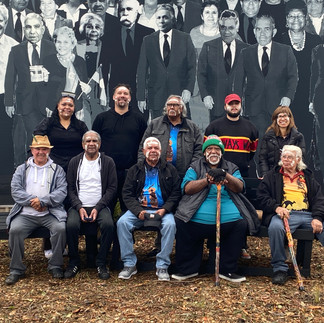Surviving the Kinchela Boys Home: truth-telling at the Aborigines Advancement League
- Carmen Lahiff-Jenkins

- May 24, 2024
- 2 min read
It’s a cool Melbourne Friday morning at the Aborigines Advancement League (AAL) in Thornbury and the first-ever Stolen Generations Mobile Education Centre (MEC) sits in the car park. It’s a huge commuter bus, now retired, that has now serves as a platform for a truth-telling and healing experience about the Kinchela Boys Home and the Stolen Generations. Kinchela was built on the stolen land of the Dunghutti people.
The horror stories of the Aboriginal boys who survived Kinchela Boys Home in NSW cannot be easily broken into digestible parts or quotes. It’s enough to know that ex-military men ran a ‘house’ where they kept kidnapped Aboriginal boys and every single horrid, devastating and heartbreaking thing you can imagine happened behind those gates.
Inside the bus is an exhibition developed in consultation with the survivors, who are now known as the ‘Uncles’. The back half of the bus has been converted into a cinema that shows a short, animated film collaboratively produced with the Uncles. And that’s what I’m here to see today. This is part of truth-telling: bearing witness.
Gumbaynggir man, Uncle Roger has a smile that lights up the room and warm intelligent eyes, but you cannot unsee the weight of the stories he holds on his shoulders, as big as the world. Uncle emphasises, ‘These were military men taught to kill, who were left in charge of children, imagine that’. The men who ran the ‘home’, living with their trauma, were damaged, dangerous people raising generations of little boys, some as young as four years old, stolen from their mothers, their names and identities replaced with numbers. Uncle Roger was number 12.
The courageous truth-telling efforts of survivors expose colonial conflicts and dispossession and recognise the strength and resilience of Aboriginal and Torres Strait Islander peoples and cultures. This strength is often present in our legal systems where Aboriginal activism has led to changes in legislation that regularly impact all Australians, such as spent convictions and public drunkenness laws.
Reservoir has a large First Nations population. Engaging with truth-telling is a way for all people to connect to First Nations people and finally have a shared understanding of what it's been like to live under colonisation with a black history.
At the end of the yarn, the Uncles were welcomed to a smoking circle and the newly planted indigenous garden. As the smoke blurred for a moment the brutal stories shared that day, the mural behind us memorialised past members of the AAL. Natashia Ellis-Corrigan, Manager of the Gurwidj Koorie Neighbourhood House said, as she welcomed us around the fire with her beautiful little boy ‘We stand on the shoulders of giants at the Aborigines Advancement League’ and indeed you can feel the ancestors watching.
The Uncles leave us all with one final plea, that we don’t repeat history. With more Aboriginal children removed from care now than at any time in the colony's history, we are in great danger of doing exactly that!











Comments